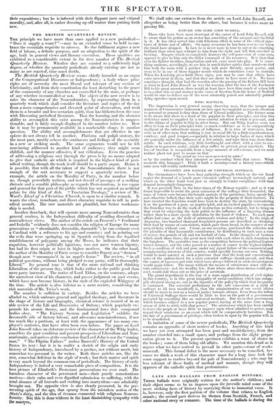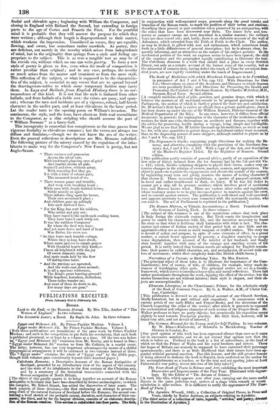LAYS AND BALLADS FROM ENGLISH HISTORY.
Tuniin ballads were originally written for the author's children ; and their object seems to be to impress upon the juvenile mind some of the more striking facts of history by marrying them to immortal verse. It is, however, only the first portion of the volume that relates to English annals ; the second part derives its themes from Scottish, French, and other national story or romance. The time of the ballads is during the ibudal and chivalric ages ; beginning with William the Conqueror, and closing in England with Richard the Second, but extending in foreign parts to the age of Cortes and Francis the First. For the youthful mind it is probable that they will answer the purpose for which they Were written ; although their length is &proportioned to their matter, which weakens the impression. Considered as verses, they are equable, flowing, and sweet, but sometimes rather mawkish. As poetry, they ere deficient, not merely in the novelty which arises from independence of mind, but in the originality that springs from a style and feeling ap- propriate to the subject. This is as true a tangible test as may be of the oitlida vis, without which no one can write poetry. To form a new style of poetry is given to few, even when the mode of composition is rather peculiar than original ; and in any case, perhaps, the novelty an much arises from the matter and treatment as from the mere style. This reflection of the subject, or what is supposed to be the characteris- tics of the subject, is essential to any verses that are to spread beyond the drawingroom-tables to which some temporary fashion may carry them. In Lays and Ballads from English History there is no cor- respondence of this kind. It is not that the style is imitated from other ballads, and from ballad&of a feeble sort: the verses are puny, and spun- out; whereas the men and incidents are of a vigorous, robust, half-heroic character in the earlier part, and at least chivalrous in the later period. Let the reader turn to the opening poem on William's invasion. The sentiments, the style, and the tone, have about as little real resemblance to the Conqueror, as a slim stripling who should assume the part of "Wiliam Norman" at a fancy-ball.
This incongruity is somewhat less conspicuous as the time passes from vigorous feudality to chivalrous romance ; but the verses are always too diffuse and feminine,—though we do not know the sex of the writer. Even the general reflections or descriptions are Mrs. Hemans enfeebled. The following picture of the misery caused by the expulsion of the inha- bitants to make way for the Conqueror's New Forest is pretty, but not Anglo-Saxon.
" There moves a sad procession Across the silent vale, With backward-glancing eyes of grief And tearful cheeks all pale. Scatterl and slow, without array, With wavering feet they go, Yet with a kind of solemn pace, The measured tread of wo.
" There women pause and tremble, And weep with breaking heart ; While men, with deeply-knitted brows, Stride mutely on apart. There infants cling upon the breast, Their own accustom'd place ; And children gaze up askingly Into each darken'd face.
"For the King has sent his soldiers, Who strike and pity not: They have razed to the earth each smiling home, They have burn'd each lowly cot. It was the ruthless Conqueror By whom the deed was done; And yet more fierce and hard of heart
Was Rufus, his stern son.
"So they leave each humble co
Where they so long have dwelt, Where morn and eve to simple prayer With thankful hearts they knelt,—
Places all brighten'd with the joy Of sweet domestic years, And spots made holy by the flow Of unforgotten tears.
'And the gardens are uprooted, And the walls cast down around; It is ails spacious wilderness,
The King's great hunting-ground ! While hopeless, homeless, shelterless,
Those exiles wander on; And most of them lie down to die, Ere many days are gone."



























 Previous page
Previous page